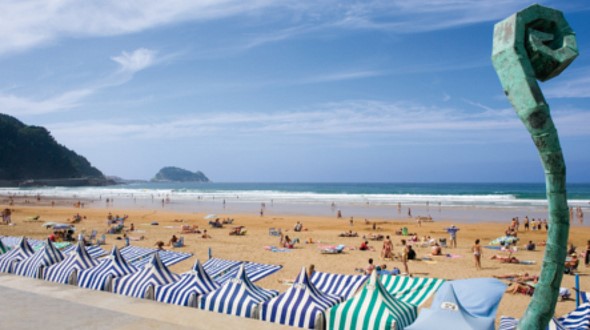Introduction to the Basque Country
The Basque Country is Spain’s most north-easterly autonomous community, on the border with France. Lying on the Bay of Biscay, it has a rugged coastline and mountainous interior; the region’s coastal situation lends it a mild climate with plentiful rainfall, so the countryside is always very green and lush.
The Basques have their own language, Euskara, and most signs are in both Spanish and Euskara. The name for the region in Euskara is Euskadi or Euskal Herria, and it covers 7,234km2 with a population of 2.1 million, almost half of whom live in or near Bilbao.
The region is divided into three provinces: Vizcaya, Gipuzkoa and Alava. The main cities are Bilbao (in Vizcaya), famous for its curved, metallic Guggenheim Museum; beach resort and foodie heaven San Sebastian (in Gipuzkoa); and inland Vitoria (in Alava), the regional capital.

Basques are known for their maritime excellence – the first man to circumnavigate the globe was Juan Sebastian Elcano, from Guetaria, who took command of Magellan’s ship after the explorer was killed, and completed the voyage.
Fishing is an important part of Basque culture, with many coastal towns still operating fleets; seafood plays a key role in Basque gastronomy, which is world-renowned for its excellence and innovation. San Sebastian, in particular, is considered one of the top gastronomic destinations in Spain; the woman voted as best chef in the world, Elena Arzak, has her restaurant in the city.
In the Basque Country, as in the rest of Spain, food is a key part of life – strolling the streets from bar to bar on a pintxo crawl is a typical way to spend a Friday or Saturday night. Pintxos are the Basque version of tapas, little morsels spiked onto a little stick, laid out in plates on the bar for you to try; keep your sticks so you know how many you’ve eaten, to pay before you leave.
One of the typical foods here is bacalao (cod), while local drinks include sidra (cider), produced naturally from apples during January to April. You can eat at sidrerias (cider houses), where a typical meal would be cod, steak and local Idiazabal cheese with quince jam.
The Basque Country has several of its own regional sports, including pelota, a squash-type ball game played against a wall, using hand, racket, bat or basket. Other unusual sports peculiar to this region include stone-lifting, wood-chopping and grass-cutting.
Want to start your journey into discovering the Basque Country? Then have a look at our competitive car hire prices.
